#i want to devour the world so i can fully understand it. the simone weil is jumping out. bigger than life sort of deal.
Text
Eat, for this is Her Body: Chainsaw Man and the Doxology of Cannibalism
"One day," Anthony Oliveira writes in "The Year in Apocalypses," [Jesus'] disciples approached their master while he was silent in prayer and made a request: 'Lord, teach us how to pray.'" From here, Jesus teaches them the Lord's Prayer, what the Catholic Church once called "the summary of the whole gospel":
Our Father, who art in heaven, hallowed be thy name; thy kingdom come; thy will be done on earth as it is in heaven. Give us this day our daily bread; and forgive us our trespasses as we forgive those who trespass against us; and lead us not into temptation, but deliver us from evil.
Denji is no one's disciple. When we first meet him, he is closer to how Oliveira describes Jesus himself, "homeless, gleaning for food in the field like a sparrow and relying on the kindness of strangers to put him up, . . . a man cheerfully resigned to powerlessness." And so, Denji doesn't need to be taught how to pray. He has always known. Every bone in his body at the opening of Chainsaw Man sings out the Lord's Prayer: "forgive me my debts", "deliver me from evil." And, of course, Denji is intimately familiar with the prayer's most pitiable, most powerful line. It's this line that he cries out to Makima when he rests, Pieta-like, in her arms at the end of the first chapter. It can only be this line, one that Denji might have written himself:
Give me, from this day forward, and for all the rest of my days, daily bread.
Bread runs throughout CSM like a mocking scent that you only fully identify in the last two chapters. It should have been a sign to all of us when the first meal Makima buys for Denji is not bread (but rather a hot dog and udon noodles). It isn't until Denji meets and enters Aki's home that he is seen making a hideously overladen slice of toast for himself, luxuriating in having all the toppings he was denied. The morning after she forces Denji to open the door to Power's death, Makima makes the very breakfast she once promised to serve Denji: eggs, coffee, salad, and sliced bread. But this is a meal that Denji never eats—maybe the only meal in the entire series that he, a survivor of the meanest starvation and poverty, ignores. There is only one other time we see this meal in CSM, and it is subtle, almost off camera, though no less meaningful: in Chapter 53, after Reze's death, as Denji sits down to breakfast once more with Power and Aki.
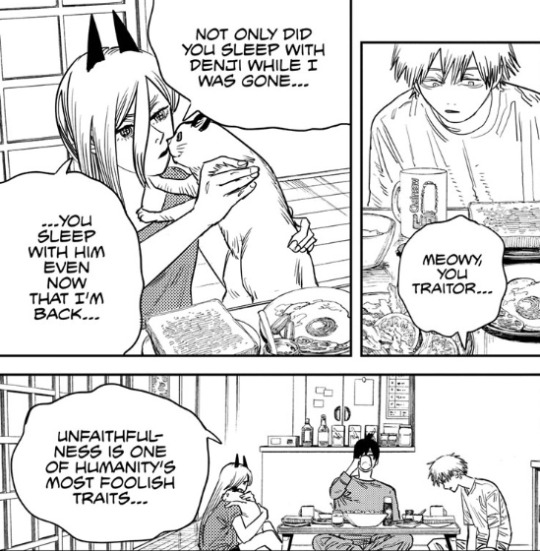
To revisit CSM's public safety arc is to see all the ways the plot connects itself to food and the act of eating, both appetizing and revolting, both profound and profane. Denji, eating gyoza at a bar for the first time. Denji being forced to swallow barf as he is kissed for the first time. The Fox Devil, who eats indiscriminately and on command, who refuses to return to Aki after being fed something disgusting. A fox that is hunted and transformed into stew. Denji eating sandwiches at Reze's cafe. Aki and Angel eating noodles. A woman sitting down to eat a hamburger for the first time, before she commits mass murder. She is worried she has lost her taste buds, yet she exclaims, "So delicious!" We know, later, that this woman is a liar, that no part of her is what she presents herself to be. Should we take this moment at its face value then? Was Santa Claus simply lucky enough to have preserved her sense of taste? Or was it her one last act of humanity, to recognize that it is not enough just to eat, that man does not live on bread alone, that there must be at least food that is also delicious, that inspires people to get up and dance—even if it means she has to lie about what she can experience?
Food is necessary for survival, and CSM is a story about survival. But CSM is also a story about glimpsing the after. After you know you can keep living, what next? After you are no longer starving, after you have been forced to kill a friend, after you have touched your first boob, after you have been betrayed, what next? After you are tired of eating toast with jam for breakfast, what do you eat next?
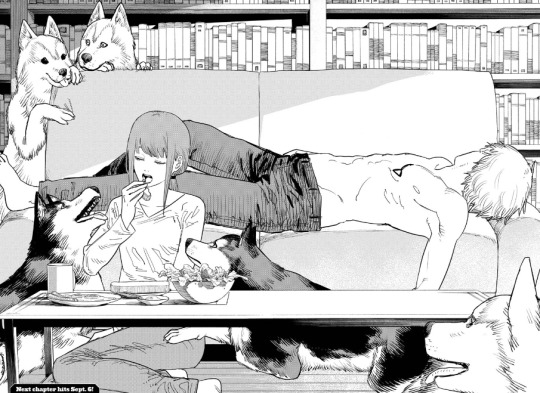
The version of the Lord's Prayer we tend to recite asks for "our daily bread." But this, most modern scholars believe, is a mistranslation. The Greek adjective as it appears in the Gospel of Matthew and Luke is "epiousios," which doesn't mean "daily" at all, but rather something too complicated etymologically for me to even begin to parse. The point is that what we ask for in the Lord's Prayer is not just bread for today, but bread for tomorrow. Both the physical bread and the spiritual bread. Bread on this kingdom of earth, and bread that is the kingdom of heaven. Bread to feed our bodies, and bread to feed our souls. The realm of the divine is full of these moments, isn't it? Of two things existing at once, in one.
Denji starts the series asking for daily bread, and ends the public safety arc with Nayuta, Makima's reincarnation, asking him for daily bread. Trash heap Denji, living with his not!dog Pochita, really was just asking for daily bread. A slice to eat for breakfast, maybe even with butter and jam. But he too learns that bread, physical bread, is not enough. Merely to subsist, to eat good food, is an empty life. And what he must give Nayuta is not just bread, as was given to him. Otherwise, he will be trapped in a cycle of creating more Makimas. Instead, he must give her a relationship, a family, a world that Makima was unable to create. He must give her, in Pochita's words, lots of hugs. He must give her, in the words of the Lord's Prayer, epiousios.
To be clear, I am not arguing that CSM is meant to be read through a Catholic lens, and I doubt Fujimoto had all of this in mind when he wrote it (though he must have thought something, given that he drew a very large print of Gustave Dore's "Satan descends upon Earth" in Makima's entranceway!). But there is something primal (primordial?) about the Lord's Prayer. If every reader can understand the horror that the Darkness Devil represents, so too we can understand the intimacy and comfort of the Lord's Prayer. It is, as Oliveira writes, "a simple peasant's mantra for detoxing anxiety." Jesus opens by addressing God as father—not king, not an all-mighty spiritual being, but rather "abba, which is rather closer to 'dad,' and not in the intercultural Greek of his adulthood, but the Aramaic of home and childhood." The Lord's Prayer asks for what we always want, the only thing any of us have ever wanted since leaving the womb as infants: for no bad things to happen, for there to be enough to eat.
Even if what we have to eat is another person.
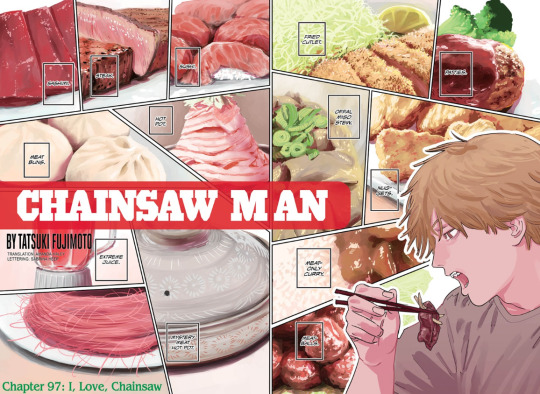
At the center of the Christian liturgy is the Last Supper, and at the center of the Last Supper is a meal that functions as ritual, abomination, accusation, transubstantiation, paranoia, and an early example of cracking open a cold one with the bros. Here, Jesus shares bread and wine with his disciples and then, as if trying to invent r/creepypasta years before its time, informs them they are actually eating his flesh and blood. This image is so powerful and heretical that the Romans accused early Christians of being cannibals. And why shouldn't they? It's there in the text. "Take, eat. This is my body. This is my blood." Stripped of the grandeur of tradition and ritual, this is downright vampiric. And yet it goes on to become the cornerstone of the Christian faith.
Oliveira begs us to see the Last Supper as a family meal, one shared by Jesus and his found family. "All he is really saying is, 'I hope when you eat together, you remember me.'" It's a good reading, one that moves me to tears, and is the framework through which I see the events of chapter 80. Because Makima is not the first time that Denji "consumes" a friend, and I don't just mean him sucking Power's blood or taking Pochita into himself. When Aki died, he left half his fortune to Denji, who uses it to support himself and Power. They "pigged out on good food," he tells us. This is Aki's symbolic body, through which he provides Denji his daily bread. Eat ice cream and onigiri in remembrance of me.
But it is not how I see the events of chapter 96. Denji does not eat Makima in the context of a feast. He does not partake of her in a communal meal, as Jesus did, among his found family. He eats every bite of Makima alone. Jesus said before his death, "this is my blood, which is shed for many." Yet Denji says to Makima, I alone will absolve you alone of your sins. I alone will bear you alone.
Denji's Last Supper is a lonely remembrance. He is hoping that no one but him will remember her. He is hoping to wholly consume her, because he loves her. "We love as cannibals," French philosopher and activist Simone Weil wrote. "Beloved beings . . . provide us with comfort, energy, a simulant. They have the same effect on us as a good meal. . . . We love them, then, as food." In fact, Weil believed we cannot love any other way. As humans, we are forever doomed to want to eat the ones we love. In order to escape, we must both be devoured by God and then become food for our fellow human beings. As Alec Irwin writes of Weil's philosophy, "the devouring violence of God must be positively harnessed in order to dismantle the machinery of human cruelty."
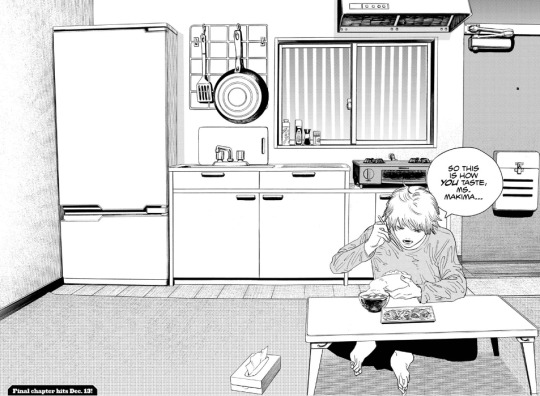
If Weil is right and being devoured is transformation, a crucial part of salvation, then in eating Makima, Denji redeems her. He turns her into food to break the cycle of her cruelty. For Makima's power itself is consuming, cannibalistic. She "eats" humans in order to use her power, which remains mysterious like God moving across the face of the earth, leaving only broken corpses as a sign of its presence. So it must be Denji, not Chainsaw Man, who does the consuming. If Pochita had consumed her, as she had always prayed for, then it would simply be another act of violence being enacted. Instead, Denji gives her salvation by turning her into human food—his food.
To Denji, Aki was human, his family, his brother, his friend. It is Makima he loves as a God and a woman. To him, she is Satan and God, his betrayer and his creator, his salvation and his friends' damnation. So he must take her, consume her, digest her, excrete her, reduce her to nothing, as she once consumed and excreted and reduced him. "I ate her to become one with her." He ate her to become her. There is no truer form of his love than for Denji to take Makima into himself. I use those words purposefully, because this is the rejection of classic cishet PIV penetration, that old hoary chestnut of men inside women. As Don Delillo famously outlines in White Noise, we talk about sex as if women are containers, rooms, elevator lobbies: "He entered me," "I want him inside me," "I took him into myself." Denji and Makima never have physical sex, but this is a consummation, a reversal of roles. We are given the only sex that Shounen Jump will allow us, with Denji taking Makima into himself. She enters him. She is inside him. He is—physically, emotionally, willingly—penetrated by her flesh. She is released inside of him, becoming part of him.
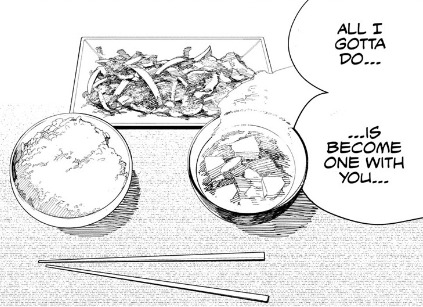
Because the divine is full of moments like this, isn't it? Of two things existing at once, in one. That is the kingdom and the power and the glory. For Makima now lives in that country inhabited by God, where loving and eating are one and the same. For that country is none other than Denji's body.
In conclusion:

Substitute Makima for "God", and the preceding statements are still rigorously accurate.
Further Reading:
Anthony Oliveira's ongoing podcast reading the Gospel of Mark (Patreon exclusive, but I highly recommend, even/especially if you are a heathen like me)
Hannibal (NBC)
Daniel Birnbaum and Anders Olsson, An Interview with Jacques Derrida on the Limits of Digestion
David Farrell Krell, "All You Can't Eat: Derrida's Course, "Rhetorique du Cannibalisme (1990-1991)." Research in Phenomenology, vol. 36, 2006, pp. 130–180. JSTOR, www.jstor.org/stable/24660636.
Alec Irwin, “Devoured by God: Cannibalism, Mysticism, and Ethics in Simone Weil.” CrossCurrents, vol. 51, no. 2, 2001, pp. 257–272. JSTOR, www.jstor.org/stable/24460795.
113 notes
·
View notes